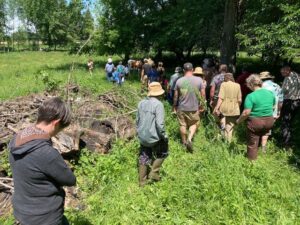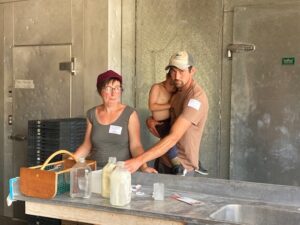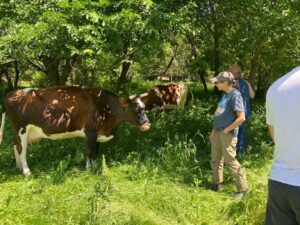Final report for ENC19-179
Project Information
MOSES’ proposal is to develop and deliver “Training on the Ground Support for Transitioning and Organic Farmers in Minnesota and Wisconsin” - a series of thirteen trainings over three years in Minnesota and Wisconsin to develop organic expertise of agricultural service professionals in conjunction with MOSES’ Organic Field Days and the MOSES Organic Farming Conference. The trainings will provide resources and information to agricultural service professionals to increase awareness and knowledge to better meet the needs of transitional and organic farmers. A diverse group of stakeholders from NRCS, Soil and Water Conservation Districts (MN), Land Conservation Departments (WI), FSA, UW and UM Extension, crop insurance agents, agricultural lenders, and RC&D will gain knowledge of certified organic farming systems and organic transition from organic experts in their fields.
Training agricultural service professionals will build upon the education and networks MOSES has provided the organic farming community over the last thirty years by expanding reach to a population working directly with organic and transitioning farmers. Developing resources for agricultural service professionals supports MOSES mission to educate farmers to thrive in a sustainable, organic system of agriculture by leveraging existing resources including the MOSES conference, field days, webinars, and attending farm tradeshows and conferences. MOSES actively partners with Wisconsin Farmers Union, Minnesota Food Association, University of Wisconsin OGRAIN, and the Women Food and Agriculture Network to provide resources. The field days and the Organic Farming Conference will provide information developed for the target audience to expand awareness and knowledge of organic farming systems.
- Deliver “Training on the Ground Support for Transitioning and Organic Farmers in Minnesota and Wisconsin,” a series of thirteen trainings including nine supplemental field day trainings across Minnesota and Wisconsin over a three year period and four full-day Organic University courses at the MOSES Organic Farming Conference over a two year period.
- Reach 240 participants (12 at each of nine field days and 33 at each of four Organic Universities) specifically targeting NRCS, Soil and Water Conservation Districts (MN), Land Conservation Departments (WI), FSA, UW and UM Extension, crop insurance agents, agricultural lenders, and RC&D and other agricultural service providers across Minnesota and Wisconsin.
- Reach a diverse set of agricultural service providers across Minnesota and Wisconsin demonstrating level of interest among agencies and organizations serving transitioning and organic farmers. Measured by registration information.
- Evaluation data about knowledge gained, subjects and issues of interest and other needs for agricultural service providers and farmers they serve.
- Develop “Training on the Ground Support for Transitioning and Organic Farmers in Minnesota and Wisconsin” curriculum that can be duplicated in other areas, including agenda, training content and resources that focus on transitioning to organic production, organic farming systems, recordkeeping, organic systems plan, organic resources and economics of organic farming systems.
- Create educational and technical resources for the trainings, Organic University Courses and continued reference by service providers including: transition to organic, organic farming systems and the economics of organic farming systems.
Cooperators
- (Educator and Researcher)
- (Educator)
- (Educator)
- (Educator)
Education
At the 2020 MOSES Conference, we hosted an Organic University class called "Conservation Programs to Support Organic Farms." This full day class introduced organic farmers and agricultural professionals to the financial and technical assistance programs available to them to meet conservation, production, and organic certification goals. It was designed to cater to people transitioning to organic, wanting to improve their existing organic farms, or working with farmers to implement conservation practices.
In January 2020, MOSES hosted an advisory committee meeting with agricultural professionals from across Minnesota and Wisconsin. MOSES staff facilitated the meeting in the "World Cafe" style, where small groups alternated through three stations to meet with the MOSES staff stationed there to discuss the various topics. The three stations were to discuss the problems and opportunities in agriculture in our two states around the different aspects of sustainability: environmental, social, and economic. Key takeaways from that meeting were the need to train both farmers and agricultural professionals in the environmental, social, and economic benefits of and strategies to transitioning to organic grain production and transitioning from confinement dairy to grazing. We also identified some business structures that we could focus on, including cooperatives and value-added enterprises. We planned on three field days for 2020. Two of them were under the theme of "Do the Numbers" to show the financial benefits of the systems as well.
Shortly after the conference, the COVID-19 pandemic shut down all in-person events. In response we switched from planning in-person field days to virtual field days. We did a "Flipped Classroom" approach that blended pre-recorded content on the MOSES Organic Farming Podcast and live virtual field days. We used this approach for two field days, covering organic grain transition economics and production and organic dairy grazing economics and production. For the third field day, we partnered with a sponsor to produce videos on value-added herb production in addition to a live virtual field day.
In 2021, we hosted three field days. For "Season Extension at Mhonpaj’s Garden," we recorded a 6-part video interview with farmer Mhonpaj Lee ahead of the field day. For the field day, MOSES staff were onsite at Mhonpaj's Garden streaming live to a virtual audience. It was interpreted live into Spanish and Hmong, and the recordings are now available online. In Decorah, we hosted "Creative Land Access and No-Till Vegetable Research" and recorded video of the event. Lastly, we hosted "Silvopasture for Livestock & Pollinators" at Mary Dirty Face Farm in Menomonie, WI. The plan was to record video of the event, but the MOSES staff person who was due to record the video had COVID symptoms on the day of the event.
At the in-person MOSES Organic University on February, 24, 2022, Steve Gabriel taught a full day class called "Silvopasture in Practice."
In 2022 we hosted three field days, two of them featured socially disadvantaged producers and highlighted their approach to organic and sustainable agriculture.
Education & Outreach Initiatives
1. Participants will know the basics of how to access conservation programs
2. Participants will learn how to identify resource concerns
3. Participants will understand the connection between conservation practices and production
4. Participants will develop strategies for improving their conservation practices, either on their farms or in their work with farmers
5. Participants will be able to set sustainability and production goals and map out how to reach them
Organic standards emphasize protecting and improving the natural resources of agricultural land. Fortunately, there are many conservation programs farmers can tap for either technical assistance, financial support, or both to achieve their goals. These programs can support a wide variety of conservation efforts, such as creating wildlife and pollinator habitat or addressing erosion and water quality issues. There is even a program that repays farmers for the services of a planner who can help write a farm's organic transition plan and guide the farmer through the process. Unfortunately, many farmers aren't aware of the help that's available. This class aimed to change that.
Participants heard from Brian Pillsbury, who has worked with the USDA Natural Resources Conservation Service (NRCS) for 22 years; Karin Jokela, an organic farmer and a pollinator conservation planner with the Xerces Society; Chuck Anderas, a MOSES organic specialist who has been working with NRCS agents to explain organic production and farmers' support needs; and, Mark Doudlah, an organic farmer who used several conservation programs as he transitioned his Wisconsin farm to organic production.
This class provided the details farmers and agricultural professionals need to pair these valuable programs with the work they do on the land for those transitioning to organic, wanting to improve their existing organic farm, or working with farmers to implement conservation practices.
Total participants: 37
Participants who were awarded a scholarship: 33
The advisory committee meeting in January 2020 identified several challenges facing farmers that agricultural professionals should focus on to bring about more financially, environmentally, and socially sustainable farming systems. This training focused on a few of those issues:
1. Markets--Family farms compete with large corporations/industrial agriculture. There are low (and fluctuating) crop prices. There is market saturation from a large supply of conventional commodities.
2. Cost of production--There is a high costs of seed, inputs, and other expenses. Many of these inputs are unnecessary inputs pushed by industry.
3. Education gaps--The advisory committee identified low financial literacy among both farmers and agricultural professionals. A key barrier is the high cost of farmer financial education. Very few farm business trainers are trained in organic and almost all of their curriculum is based on the economics of conventional agriculture and takes 6 years to complete (in the WI tech college system).
The advisory committee also identified potential solutions for each of those issues:
1. Markets--Co-op development (competition, prices), work with branding organizations to create marketing power (market saturation, consumer education), encourage value-added enterprises (prices, market saturation), create infrastructure for alternative crops and markets (prices, saturation)
2. Cost of production/transition--Organic transition loans to cover operating costs, NRCS Organic Initiative (pays to help lay out transition plans and cost share)
3. Education--Education for ag professionals on how their programs and businesses can help organic farmers, educate farmers to “dig into the numbers” of organic transition and grazing operations.
Originally planned as an in-person field day, we pivoted to virtual events and resources due to COVID-19. MOSES staff Chuck Anderas interviewed Paul Dietmann from Compeer Financial and Jon Jovaag, a farmer near Austin, MN for a podcast episode leading up to the virtual field day. The episode covered how to think through cash flow versus profitability during the transition years, what crops to use in an organic grain rotation rotation, and the reasons why farmers transition to organic. That podcast episode was followed by a virtual field day in which both Paul Dietmann and Jon and Ruth Jovaag delved deeper into organic grain transition.
Virtual field day live attendees: 84
Virtual field day YouTube views: 181
Podcast episode plays: 401
Podcast episode YouTube views: 48
The advisory committee meeting in January 2020 identified several challenges facing farmers that agricultural professionals should focus on to bring about more financially, environmentally, and socially sustainable farming systems. This training focused on a few of those issues:
1. Markets--Family farms compete with large corporations/industrial agriculture. There are low (and fluctuating) crop prices. There is market saturation from a large supply of conventional commodities.
2. Cost of production--There is a high costs of seed, inputs, and other expenses. Many of these inputs are unnecessary inputs pushed by industry.
3. Education gaps--The advisory committee identified low financial literacy among both farmers and agricultural professionals. A key barrier is the high cost of farmer financial education. Very few farm business trainers are trained in organic and almost all of their curriculum is based on the economics of conventional agriculture and takes 6 years to complete (in the WI tech college system).
The advisory committee also identified potential solutions for each of those issues:
1. Markets--Co-op development (competition, prices), work with branding organizations to create marketing power (market saturation, consumer education), encourage value-added enterprises (prices, market saturation), create infrastructure for alternative crops and markets (prices, saturation)
2. Cost of production/transition--Organic transition loans to cover operating costs, NRCS Organic Initiative (pays to help lay out transition plans and cost share)
3. Education--Education for ag professionals on how their programs and businesses can help organic farmers, educate farmers to “dig into the numbers” of organic transition and grazing operations.
Originally planned as an in-person field day, we pivoted to virtual events and resources due to COVID-19. MOSES staff Chuck Anderas interviewed Dr. Jon Winsten from Winrock International and organic dairy farmers Thelma Heidel-Baker and Ricky Baker for two podcast episodes. Dr. Winsten outlined three key metrics to look at when considering a dairy farm’s financial viability: feed efficiency, labor efficiency, and capital efficiency. Then, Thelma and Ricky listened to the podcast, and Chuck Anderas interviewed them about how it applies to their farming operation. The podcasts were followed by a virtual field day featuring videos and pictures from Thelma and Ricky's farm. They shared how they manage their grass-based, organic operation, covering pasture care, conservation practices, and organic livestock health. Dr. Jon Winsten went into more detail on the economics of grazing and shared financial case studies from Upper Midwest dairy farms—from confinement operations to pasture-based farms.
Virtual field day live attendees: 58
Virtual field day YouTube views: 161
Podcast episode plays (Dr. Jon Winsten): 342
Podcast episode plays (Thelma Heidel-Baker and Ricky Baker): 287
Building off the advisory committee meeting, we covered medicinal herb production as a value-added enterprise to help vegetable farmers address prices and market saturation.
MOSES Organic Farmers of the Year, Jane Hawley Stevens and David Stevens, showcased a variety of herbs they grow on their farm and discussed their many medicinal uses, especially focusing on immunity boosting herbs. They discussed production, harvest, and drying techniques.
Virtual field day live attendees: 154
Virtual field day YouTube views: 1,679
-Educate farmers through each stage of funding, purchasing, constructing, and growing in high tunnels
-Share ideas with ag professionals for assisting Hmong farmers
-Make NRCS EQIP more accessible to Hmong farmers
Farmer and educator Mhonpaj Lee, the first certified organic Hmong farmer in Minnesota, shared her expertise and experience funding, building, and using high tunnels to grow vegetables. Leading up the the virtual farm tour, Mhonpaj Lee recorded a 6-part series guiding farmers through six key elements of high tunnels: resources for building a high tunnel, advice for building a high tunnel, raising seedlings in high tunnels, growing vegetables in the ground, working with the USDA to fund a high tunnel through NRCS EQIP, and the business management of high tunnels.
The video interviews were followed by a live, virtual farm tour. It was interpreted live into Spanish and Hmong. Before talking through production topics on the farm, we also had two guest speakers from the USDA to share about about NRCS and FSA support for high tunnels. John Sippl shared about NRCS EQIP funding and technical support, and Heather Kirkpatrick from FSA shared on eligibility requirements. The recordings from the event are available in English, Spanish, and Hmong.
See the High Tunnel playlist on the MOSES YouTube channel here: https://youtube.com/playlist?list=PLDbgVNKGiK8soBkeWsbDDm47r0Allule5
Virtual field day live registrants: 78
Virtual field day YouTube views, English: 131
Virtual field day YouTube views, Spanish: 28
Virtual field day YouTube views, Hmong: 32
High Tunnel video series views: 99
Climate Resilient Practices
-Share NCR-SARE Farmer Rancher grant no-till organic vegetable research
-Promote rotational grazing on a small scale
Nontraditional pathways to farming
-Share Humble Hands Harvest's unconventional approach to financing
-Highlight a worker-owned cooperative farm
-Building a farm from scratch for first generation farmers
Farmers Hannah Breckbill and Emily Fagan gave a tour of their unique CSA farm. Humble Hands Harvest is located on 22 acres northeast of Decorah, and over the past five years has converted conventional cropland to a highly diverse, worker-owned farm with perennial crops as well as organic vegetables, grass-fed lamb, and pastured pork. This field day explored the various systems on the farm, including a SARE-funded no-till project, livestock rotations, and the system of worker-ownership and community engagement that has allowed Humble Hands Harvest to thrive.
The field day was preceded by a podcast episode focusing on the cooperative ownership of the farm. A video was produced from the field day called "Cooperative Land Access & the Commons."
Field day registrants: 14
Cooperative Land Access & the Commons YouTube views: 26
MOSES Organic Farming Podcast episode "Queering Farm Ownership: Inside a Worker-Owned Cooperative Farm with Hannah Breckbill of Humble Hands Harvest" plays: 421
Promote the ecological, social, and economic value of silvopasture by covering:
-Silviculture strip installation & management
-Pollinator biology and resource concerns
-Tree and shrub species selection
-Livestock considerations (cattle & hogs)
-Renting pasture for grass-fed beef as added on-farm enterprise
We hosted a silvopasture-pollinator field day at Mary Dirty Face Farm, co-hosted with the Xerces Society. Farm host Rachel Henderson and Xerces pollinator specialist Sarah Foltz Jordan discussed habitat value both in terms of forage and shade for livestock and food and nesting for pollinators, especially specialist bees, butterflies, and moths that require certain tree and shrub species to survive. Silviculture Matt Wilson from the Savanna Institute provided additional guidance on habitat design, installation, and weed management.
Rachel Henderson explained to the group how a SARE grant, with help from the Xerces Society, and the NRCS helped to fund the new silvopasture installation. All trees and shrubs that were planted were native species, including basswood, shag bark hickory, and service (June) berries.
Field day registrants: 39
-Educate farmers and agricultural professionals on silvopasture
-Encourage NRCS agent participation so they can better serve farmers through conservation practices
While modern agriculture has well-defined boundaries between forest and pasture, systems that integrate trees, livestock, and forages have a long and storied past. Silvopasture systems are productive while also sequestering carbon in the landscape and providing climate resiliency for farmers. This workshop explored historical narratives, strategies to convert woodlands and add trees to pasture, and offered a range of starting points for farmers looking to bring trees into their grazing systems.
The class was taught by Steve Gabriel. Steve is an ecologist, forest farmer, and educator living in the Finger Lakes Region of New York State in the US. Throughout his career, Steve has taught thousands of farmers and land managers about the ways farming and forestry can be combined to both benefit the ecology and the bottom line of the farm. He is Agroforestry Extension Specialist for the Cornell Small Farm Program and has served as guest faculty at Cornell University, Sterling College, Paul Smiths College, and the Omega Center for Sustainable Living.
Alongside his wife, Elizabeth, he co-stewards Wellspring Forest Farm, where they produce mushrooms, maple syrup, duck eggs, pastured lamb, and elderberry extract, all from forest-based systems.
Steve co-authored Farming the Woods with Ken Mudge in 2014, and is author of the new book Silvopasture, released in 2018. He passionately pursues work to reconnect people to the forested landscape and see the value of trees and forests as an essential part of a regenerative future.
We also awarded 22 scholarships to agricultural professionals to attend the Organic University of their choice.
Organic University registrants: 33
Organic University scholarships for agricultural professionals: 22
Demonstrate the complexity and benefit of diversified income streams on organic farms.
Identify opportunities for farmers to reduce in-put costs through diversity of operations.
Explore a business model that is diverse and enables local eating for an extended season.
Oxheart Farm in Wisconsin is in their 10th season in production. They raise vegetables for 75 CSA members who all pick up on the farm through our free-choice, market-style CSA from April-December. They rotationally graze pigs, laying hens, beef cattle, and four dairy cows which they milk for on-farm Grade A Dairy plant. Most of the eggs, meat, milk and yogurt they produce are sold through the CSA, and theyalso sell the dairy through a couple small wholesale channels. They also cultivate small amounts of cut flowers and shiitake mushrooms as well. Their farming model is built on a belief in diversity, small-scale production, self reliance, and minimal inputs. They follow organic practices in all of our enterprises, though we are not certified organic.
Field day description: We will share our story of how we started our small, rotationally grazed dairy cow herd and our on-farm, Grade A creamery. This field day will include a tour of our silvopastures, our seasonal milking parlor, and our Grade A dairy plant. We will discuss how the creamery fits into the bigger picture of our farm and business; how we have incorporated the cows and their milk into our ecosystem and CSA model, respectively. We'll also cover direct marketing, navigating the regulatory process for starting a dairy plant, and answer any questions about starting and running this enterprise.
Highlight the "grow dome" on site as a production method
Experience the outcomes of the producer training program
Increase understanding of needs of tribal communities, and learn more about the food sovereignty work tribal nations are doing and how ag professionals can engage with tribes
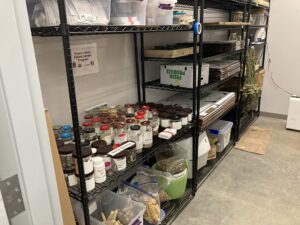
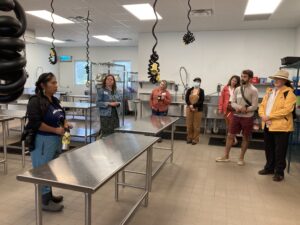
We had the privilege to tour two incredible agricultural sites of the Fond du Lac Band of Lake Superior Chippewa in the Cloquet, Minnesota area this past August. Gitigaaning, which means “the place of the gardens” in the Ojibwe language, is a 36- acre farm with a growing dome, orchard, berry patch, pollinator plantings, and 4-acres open to the growers of the Bimaaji'idiwin Producer Training Program. Three of the farm’s producers were able to share their stories and talk about the important role the farm plays in their community. We were also able to visit two local lakes and learned about manoomin (wild rice) and the importance of treaties in tribal food sovereignty, including the management, production, and marketing aspects of manoomin. In addition we learned about ancestral woodland management techniques which also support wild blueberry production. We were also able to tour Na'eniminigamig, a cannery building with a root cellar, seed room, and commercial kitchen.
82 people registered
Theme of evaluations and comments indicated the usefulness of learning more about food sovereignty efforts and creating more programs that highlight work in tribal nations.
Identify challenges faced by beginning farmers with the intersection of being 'new American' farmers
Build community for new American farmers and other beginning farmers
Identify government and non-governmental resources for farm infrastructure and equipment
Discuss models of land access, specifically lease versus purchase
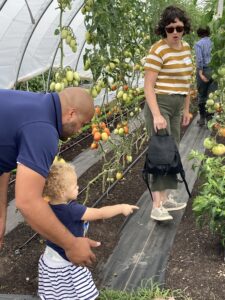
We joined one of our own Marbleseed Specialist, Naima Dhore, and her husband Fagas Salah, at Naima’s Farm in Alexandria, Minn. for an inspiring field day addressing the challenges and triumphs of starting up a first-generation farm. Originally settling in the Twin Cities metropolitan region from Somalia, land access was a big hurdle for them to overcome. Through a creative land lease out in Alexandria this was overcome. We had the opportunity to tour Fagas and Naima’s expanding vegetable operation and learn about how they were able to install needed infrastructure - high tunnels and a well - through the NRCS cost-share program, as well as a very needed deer fence, purchased with a grant from Lakewinds Co-op.
39 People Registered
All evaluation responses indicated the information presented was 'very useful'
Educational & Outreach Activities
Participation Summary:
Learning Outcomes
Project Outcomes
Do the Numbers: Organic Dairy virtual field day: https://www.youtube.com/watch?v=rlzcatds2e0&list=PLDbgVNKGiK8stqSJyC7Z77BrGxz83M2np
Do the Numbers: The Economics of Dairy Grazing podcast: https://anchor.fm/moses-podcast/episodes/Do-the-Numbers-The-Economics-of-Dairy-Grazing-ef0opn
Do the Numbers, Part 2: Dairy Graziers on the Economics of Dairy Grazing podcast: https://anchor.fm/moses-podcast/episodes/Do-the-Numbers--Part-2-Dairy-Graziers-on-the-Economics-of-Dairy-Grazing-efk3rf
Do the Numbers: Organic Crop Transition virtual field day: https://www.youtube.com/watch?v=-0-U3bxeEiM&list=PLDbgVNKGiK8uXDGszPVwjEvE32UmvXuvZ&index=9
Do the Numbers: Organic Grain Transition: https://anchor.fm/moses-podcast/episodes/Do-the-Numbers-Organic-Grain-Transition-eg7mqs
Medicinal Herb Production at Four Elements Organic Farm virtual field day: https://www.youtube.com/watch?v=5ob3RjEoJqM&list=PLDbgVNKGiK8stqSJyC7Z77BrGxz83M2np&index=10
High Tunnel videos playlist: https://youtube.com/playlist?list=PLDbgVNKGiK8soBkeWsbDDm47r0Allule5
Queering Farm Ownership: Inside a Worker-Owned Cooperative Farm with Hannah Breckbill of Humble Hands Harvest: https://anchor.fm/moses-podcast/episodes/Queering-Farm-Ownership-Inside-a-Worker-Owned-Cooperative-Farm-with-Hannah-Breckbill-of-Humble-Hands-Harvest-esu8nv
Cooperative Land Access and the Commons: https://youtu.be/ej3DGT7E8a4
Collaborating with Nature: https://issuu.com/marbleseed/docs/septemberoctober2022/s/16892076 An article on the field day held at Gitigaaning
The project has helped us grow our in-person educational events like field days and classes. It has also allowed us to be able to develop a hybrid approach between in-person events, pre-recorded audio and video before the event, and recorded video from the event. This approach allows us to dive deeper into the complex topics covered at the events. For example, having a podcast episode about the details of cooperative farm ownership and management with Hannah Breckbill allowed us to go deeper into the details of how and why they are organized as a worker-owned cooperative. The field day offered an opportunity to connect the dots between the concepts discussed on the podcast with the farming practices they are using to diversify their farming operation both ecologically and financially. The podcast and the video from the event also make the content much more widely available than the field day, and more accessible to a wider range of people both geographically and socioeconomically.
In 2021, we continued on the themes started in 2020 that focused on the intersection of practices that allow farmers to thrive economically but also build soil and protect natural resources.
In 2022 we added the importance of diversity in successful farming operations; from diversity of production and methods to approaches taken by historically underserved communities and their connection to land stewardship.
"I like the comprehensive tour of the property and the input from other attendees that helped support topical discussion. It was good to hear about the resources of NRCS, Savanna Institute, and Xerxes. Also it was interesting to see the early stages of their incorporation of livestock and trees." -Farmer attendee
"Really good 'intro' information for those interested in greenhouses or high tunnels. The speakers all seemed genuine and available for questions or follow-up communication." -NRCS staff from Iowa
"I appreciate the connections and introductions to other farmers and what different folks are doing, the knowledge-base. I like that the featured farms seem to be economically sustainable." -Farmer attendee
"I learned more about possible scenarios of land changing hands, what can work with careful measures for both parties, and ensure the party moving onto the land is not overwhelmed and has time to know this will work for them + their purpose."-Landowner attendee
"The event was incredibly impactful! Exceeded my expectations and I gained a lot of new insights, particularly the cultural connection to the land the people of the programs have."--Ag Professional at Gitigaaning Field Day
